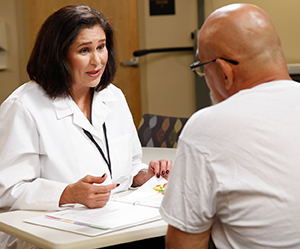A
B
C
D
E
F
G
H
I
J
K
L
M
N
O
P
Q
R
S
T
U
V
W
X
Y
Z
Click a letter to see a list of conditions beginning with that letter.
Click 'Topic Index' to return to the index for the current topic.
Click 'Library Index' to return to the listing of all topics.
Kidney Disease: Choosing the Right Protein for Your Body
Eating the right kind and amount of protein is important when you have kidney disease. It helps keep you healthy and protects your kidneys.
Choosing the right amount of protein
If you have kidney disease but are not on dialysis, you may need to eat less protein. This can help slow down damage to your kidneys. Your doctor or dietitian will tell you how much protein you can eat. This depends on:
-
Your body weight
-
How bad your kidney disease is
-
How much protein is in your urine
-
How active you are each day
It is important to follow your doctor's plan.
How much protein can you eat?
The amount of protein you can eat may change over time. It depends on how well your kidneys are working. Your doctor will tell you how much protein to eat based on the stage of your kidney disease and your body weight. If you need to eat less protein, you may need more calories from other foods. Carbohydrates, like bread and pasta, are good choices. Write this down:
Choosing the right type of protein
When you have kidney failure, you need to eat less phosphorus. Many high-protein foods, like milk and cheese, have a lot of phosphorus.
Your protein choices may also depend on your culture, religion, or beliefs. For example, you may follow a vegetarian, vegan, kosher, or halal diet. Your dietitian and health care team can help you choose the right kind of protein and the right amount for you.

Online Medical Reviewer:
Raymond Turley Jr PA-C
Online Medical Reviewer:
Sravani Chintapalli Researcher
Date Last Reviewed:
2/1/2025
© 2000-2025 The StayWell Company, LLC. All rights reserved. This information is not intended as a substitute for professional medical care. Always follow your healthcare professional's instructions.